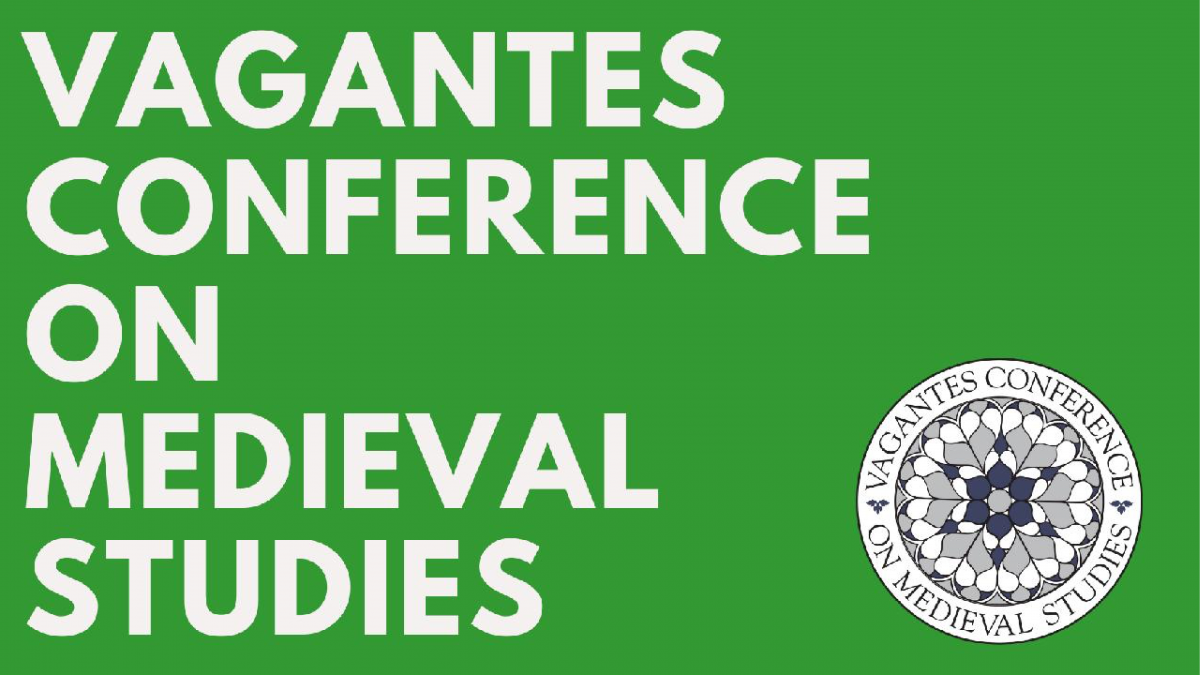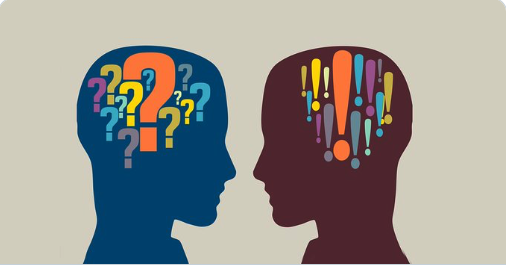Pursuant to the the University of Connecticut (UConn) policies and guidelines in response to the COVID-19 outbreak, the UConn-Humanities Institute (UCHI) will remain closed for the duration of the spring semester.
Jeffrey Peterson on the Extended Evolutionary Synthesis & Niche Construction
Niche Construction: Biosemiotics and Recursivity in Evolution
By Jeffrey Peterson
The Extended Evolutionary Synthesis (EES) has well-known antecedents in evolutionary biology. For instance, in the mid-20th Century Conrad Waddington anticipated the salience of developmental bias and epigenetic inheritance as evolutionary processes in the EES. Aspects of niche construction theory, another core process within the EES, was articulated decades ago by Richard Lewontin. However, the theoretical contributions of anthropologists regarding niche construction are lesser known. Gregory Bateson and Kinji Imanishi make particularly salient corrections to neo-Darwinian natural selection that are now foundational within the EES, such as the mutual mutability of organism-environment relations and the concomitant implications for selection within such dynamic ecological systems. Here, I further explore the potential contribution of Philosopher Charles Sanders Peirce’s semiotic theory toward elucidating the mechanisms of information flow in John Odling-Smee and colleagues’ formalized conception of niche construction. Drawing on the work of these theorists, I connect them with the underlying process of reciprocal causation in niche construction, which envisions co-responding proximate and ultimate evolutionary patterns. I argue that recognizing these integrated processes as biosemiotically recursive patterns will strengthen the conceptual and explanatory value of niche construction.
Monday, March 30 2020, at 2:30PM; UCHI Conference Room, Babbidge Library, Fourth Floor.
Co-Sponsored by UConn Anthropology Department; Philosophy Department; Expression, Communication, and the Origins of Meaning (ECOM) Research Group; and James Barnett Endowment for Humanistic Anthropology.
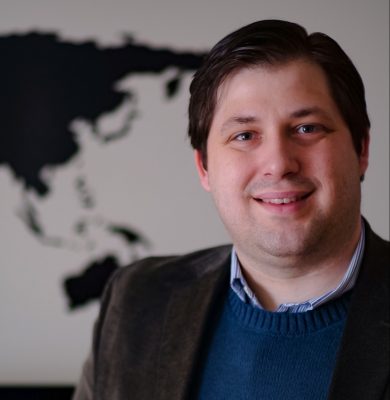 Jeffrey Peterson
Jeffrey Peterson
Postdoctoral Fellow, University of Notre Dame
Dr. Jeffrey Peterson is a postdoctoral fellow in the Anthropology Department at the University of Notre Dame. His research focuses on the wide-ranging manifestations of long-tailed macaque (Macaca fascicularis) social behavior in anthropogenic landscapes. He is interested in how social interactions facilitate and maintain relationships among the macaques, as well as between macaques and humans. His research has been supported by the National Geographic Society and the Fulbright U.S. Scholar Program.
Folger Research Report: Dr. Debapriya Sarkar
Today’s blog post describes Dr. Debapriya Sarkar’s research trip to the Folger Shakespeare Library
Thanks to the support of the Early Modern Studies Working Group, I was able to return to the Folger for a short trip in Fall 2019 before the library closed for renovation. I am in the early stages of research on a new project on terraqueous spaces—islands, shores, riverbanks—in early modern romance, and I wanted to consult some maps at the Folger that would enable me to think further about how these spaces functioned across different representational media. The project asks how the liminal spaces that demarcate the boundaries between land and water not only provide physical relief from the maritime dangers, but also serve as symbolic escapes from nature’s unpredictable forces. Before going to the Folger, I had been tracking how the instabilities of the romance form provided writers with an ideal literary mode within which to use these thresholds—between inland and ocean, between calm and chaos, and even between life and death—to inquire about the struggles of humans to understand, control, and manipulate their natural surroundings. While I had consulted images available on LUNA, I hoped to study a few of the atlases in greater detail at the library. At the Folger, I decided to begin by looking at the physical copies of some of the same texts I had studied online, since I hope—as the project develops—to think more about how the maps were compiled and ordered, and if such organization follows other logics of collection and compilation prevalent in the period. During my visit, I focused on English translations and abridgments, but I plan to expand my archive in future archival trips.
Here, I want to highlight how the descriptions of islands in early modern atlases often become repositories of the complex entanglements of physical, socio-political, and environmental issues with which thinkers were grappling. In a 1603 copy of Ortelius’s Theatrum Orbis Terrarum (STC 18856)—considered to be the first modern atlas—the dangers of an island’s coast are often mitigated by appealing to the ideality of its landscape, suggesting that the coast marks a limit-point for one’s experience of safety and precarity. For instance, describing the island of Tercera, the text notes that even though the “Ile is hillie, but yet very pleasant, braring greate stoore of ceader trees,” getting there is difficult: “the coasts are daungerous by reason of the flatts and shaloes.” In another example from this same edition, we see that the value ascribed to the land is inseparable from stereotypes about its inhabitants—describing the island of Sardegna in the Mediterranean, the text appeals to the “slouthfullnesse of the people” to explain why the island “yeelds no oile.” A 1635 copy of Historia mundi: or Mercator’s atlas (STC 17824) states that in the Molucco islands of the East-Indies, “The Ayre is very unwholesome, and many Merchants that come to trade, doe die here.” This is not a simple statement of fact about natural conditions; instead, it uses physical otherness of the island to depict the anxiety of the Europeans whose colonizing ambitions demanded they familiarize themselves with distant places for profitable ventures such as the trade of spices. This edition of Historia mundi also gives a detailed description of the Summer Islands, or the Bermudas, that highlights why literary scholars consider this territory a key intertext for Shakespeare’s late romance, The Tempest. Historia Mundi’s descriptions of the Summer Islands’s “stormes and tempests” offer a clear indication of why this space—different in climate and distant in location—captured the English imaginary, even as travelers attempted to domesticate a particularly intractable foreign environment. These examples offer a glimpse of the myriad issues these atlases invoke that can help us think about connecting scholarship on colonial encounters, environmental humanities, material texts, and related topics. For literary scholars, the atlases also offer a distinctly multimodal entry point into the question of how the simultaneously contained and unknowable terrain of the island was rich for exploitation by romance writers who were testing the boundaries of self and other, known and unknown, in their formal experimentations.
UCHI Co-Sponsors Nineteenth Annual Medieval Studies Conference
The nineteenth annual Vagantes Conference on Medieval Studies will be held in Storrs and Hartford, Connecticut, on March 19–21, 2020. Plenary lectures for this conference, which is co-sponsored by the University of Connecticut Humanities Institute (UCHI), will be delivered by Dr. M. Breann Leake of UConn English Department and Dr. Thomas E. A. Dale, of the University of Wisconsin, Madison.
The Plenary Lectures
Dr. Leake’s lecture is entitled “‘Nevertheless, You Must Sing’: The Coercion of the Archive.” It will be delivered on Thursday, March 19 at 3PM in the Konover Auditorium in Storrs, CT.
Dr. Dale’s lecture, entitled “Race-Making in Medieval Venice: Representing Saracens and Jews in the Basilica of San Marco, ca. 1215-1280” is scheduled for Saturday, March 21, at 2:30PM in the Hartford Times Building, Room 146.
Other sponsor of this conference include: UConn Medieval Studies Program, Medieval Academy of America, English, Department Speakers and Symposia Committee, Department of English, Department of Literatures, Cultures, and Languages, Center for Judaic Studies, Department of, History, Women, Gender, and Sexuality Studies, Department of Philosophy, and the Thomas J. Dodd Research Center.
For more details and to register, please visit the conference website.
Fellows Talk: Morgne Cramer on The Cry of the Choir Boy and Virginia Woolf’s “The Waves”
The Cry of the Choir Boy as Love Song in Virginia Woolf’s The Waves
Patricia Morgne Cramer, Ph.D. (Department of English; University of Connecticut-Stamford)
March 11, 2020 – 4 to 5PM (UCHI Conference Room: Babbidge Library, 4th Floor South)
Virginia Woolf wrote The Waves (1931) during an unprecedented surge of exposés on corporal punishment, bullying, and sexual abuse of boys in British public schools. Read alongside these “old boy” diatribes, the cry of the choir boy wafting through The Waves surfaces as the voice of shock and terror, echoing down the ages, of little boys coming to manhood amid the omnipresent threat of male violence and sexual violation where survival requires “toughening up” fast. What Woolf seems to capture in this dove-like choir boy cry is a resurgent, resistant male voice also discernible in these memoirs. Does Woolf record in the song of the choir boy a nascent shift in the collective consciousness of early twentieth century elite European men? Did she read modernists’ protests against their tortured boyhoods as the glimmerings of a more profound revolution than these would-be rebels actually achieved? Does Bernard’s refusal of that call at the end of the novel mark a male-gendered generational as well as personal failure?
The talk will begin at 4PM, but a dramatic reading of The Waves will be played in the UCHI conference room 3:45-4 pm.
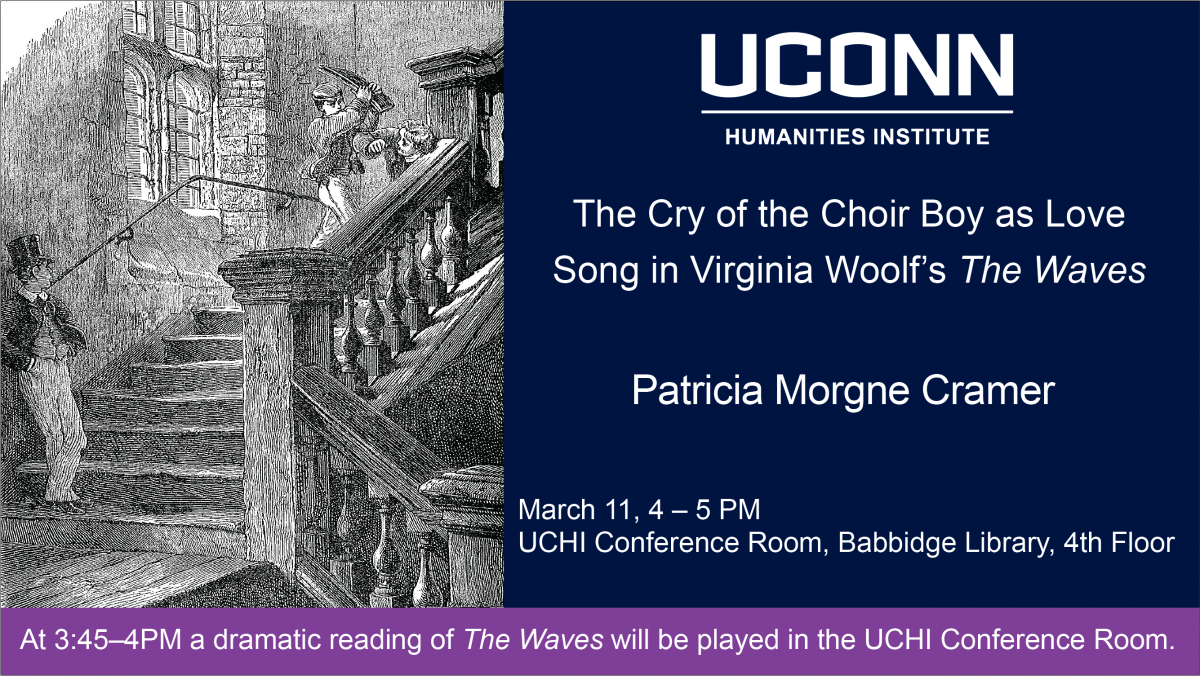
If you require accommodation to attend this event, please contact us at uchi@uconn.edu or by phone (860) 486-9057.
Who is Patricia Morgne Cramer?
Patricia Morgne Cramer is an Associate Professor of English at the University of Connecticut, Stamford. Her current project draws on her prior publications on Woolf and sexuality, especially those reading Woolf as a lesbian author alongside her homosexual male peers. These include “Virginia Woolf and Theories of Sexuality” in Virginia Woolf in Context (Cambridge University Press, 2012) and “Woolf and Sexuality” in The Cambridge Companion to Virginia Woolf (2010). Morgne Cramer is also co-editor of Virginia Woolf: Lesbian Readings (New York University Press, 1997).
Publishing NOW: Book Traces & Getting Published
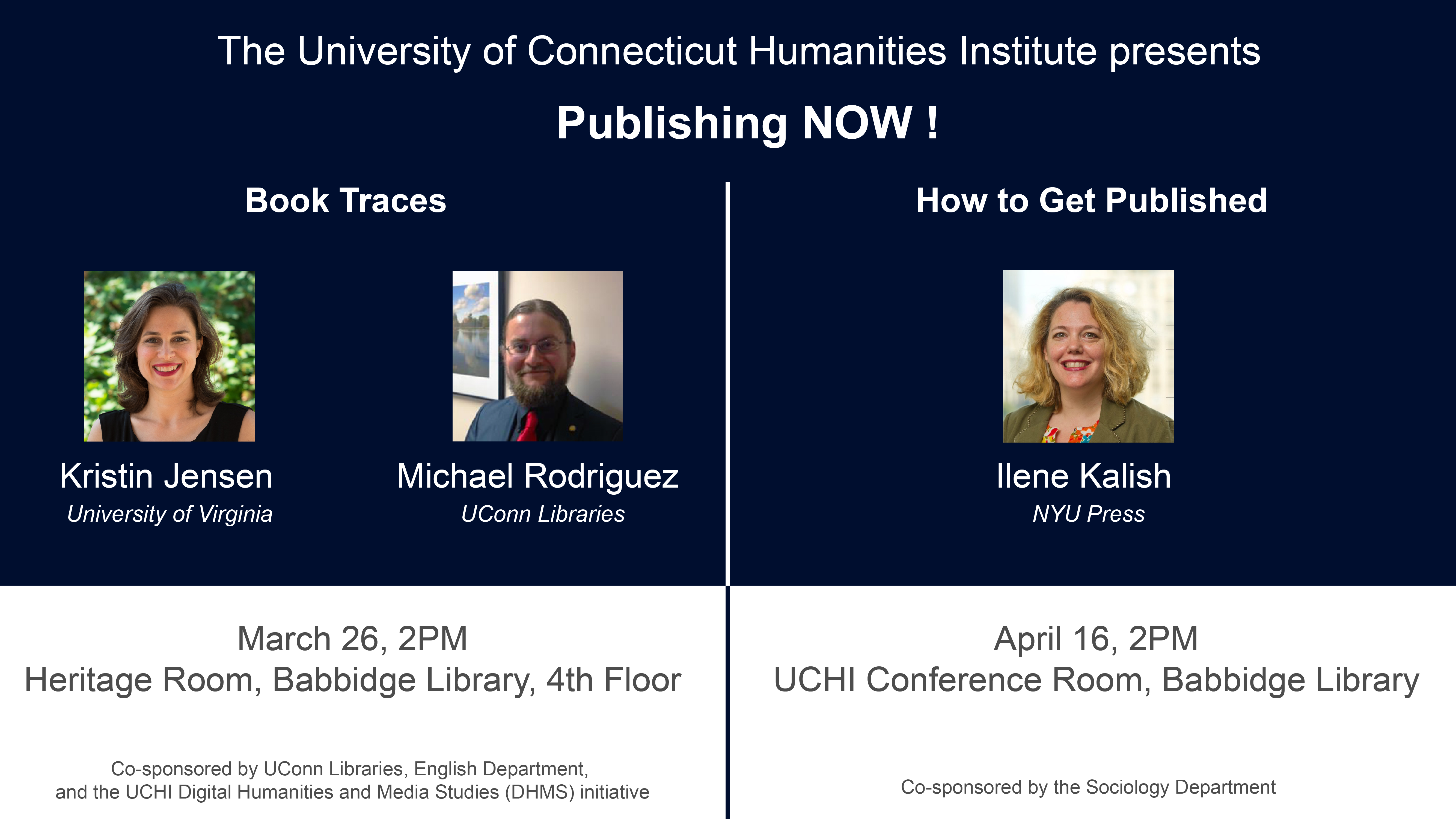
If you require accommodation to attend this event, please contact us at uchi@uconn.edu or by phone (860) 486-9057.
The University of Connecticut Humanities Institute presents:
Publishing NOW!
Book Traces
with Kristin Jensen (University of Virginia Library) and Michael Rodriguez (UConn Library)
March 26th, 2PM
Heritage Room, Babbidge Library, 4th Floor
Co-sponsored by UConn Libraries, English Department, and the UCHI Digital Humanities and Medial Studies (DHMS) initiatives.
How to Get Published
with Ilene Kalish (NYU Press)
April 16th, 2PM
UCHI Conference Room, Babbidge Library, 4th Floor South
Co-sponsored by the Sociology Department
Michael Lynch Speaks with BBC about Facts and Arrogance
UConn Humanities Institute director, Michael Lynch, joins a team of experts to speak with BBC World Service’s The Inquiry about the role of facts, arrogance, and tribalism in our societies. This episode strives to understand why we have such a great capacity to ignore facts and to believe them only when they match our convictions and what are the political, psychological, and social consequences of this increasingly entrenched behavior?
You Should…Read: Midnight in Chernobyl (Marisa Chrysochoou, UConn-Civil and Environmental Engineering)
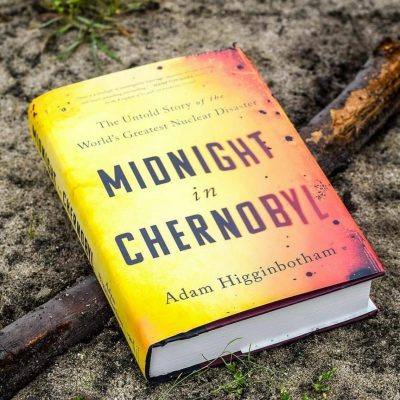 The role of the humanities and liberal arts education in the 21st century is a topic of intense debate. If the sciences are the foundation for inventing new technologies, the humanities are the foundation for implementing these technologies sustainably and ethically. Adam Higginbotham’s account of the Chernobyl accident is what the New York Times called “an enthralling and terrifying history” of technology gone wild in human hands. There is no better evidence of the role of politics, ethics and psychology in the making of a disaster over a period of decades. The Chernobyl accident was not a human error of the moment, nor a slip in judgment that inevitably happens to scientists and engineers when we fumble with experiments and machines on a daily basis. It was the result of an entire political system that pursued short-term wins, covered inconvenient truths, and promoted allegiance to ideology.
The role of the humanities and liberal arts education in the 21st century is a topic of intense debate. If the sciences are the foundation for inventing new technologies, the humanities are the foundation for implementing these technologies sustainably and ethically. Adam Higginbotham’s account of the Chernobyl accident is what the New York Times called “an enthralling and terrifying history” of technology gone wild in human hands. There is no better evidence of the role of politics, ethics and psychology in the making of a disaster over a period of decades. The Chernobyl accident was not a human error of the moment, nor a slip in judgment that inevitably happens to scientists and engineers when we fumble with experiments and machines on a daily basis. It was the result of an entire political system that pursued short-term wins, covered inconvenient truths, and promoted allegiance to ideology.
Does this remind you of anything in our current handling of a crisis?
And yet I am sure that there will be many climate-change deniers who read the book and sneer at the incompetence and blindness of their Soviet counterparts of 1986.
Regardless, you will also have supreme fun reading this book that is written as a Stephen King suspense novel.
– Marisa Chrysochoou
Professor of Civil and Environmental Engineering
University of Connecticut
 Who is Marisa Chrysochoou? Marisa Chrysochoou is a professor and the head of the Civil & Environmental Engineering Department. She received her Ph.D. in 2006 from the Stevens Institute of Technology. Her research focuses on fate and transport metals in the environment, environment and surface chemistry, and treatment and reuse of industrial waste, contaminated soil, and sediments. She has also been awarded a prestigious Marie Curie International Incoming Fellowship.
Who is Marisa Chrysochoou? Marisa Chrysochoou is a professor and the head of the Civil & Environmental Engineering Department. She received her Ph.D. in 2006 from the Stevens Institute of Technology. Her research focuses on fate and transport metals in the environment, environment and surface chemistry, and treatment and reuse of industrial waste, contaminated soil, and sediments. She has also been awarded a prestigious Marie Curie International Incoming Fellowship.
Folger Research Report: Dr. Ken Gouwens
Today’s blog post describes Dr. Ken Gouwens’ research trip to the Folger Shakespeare Library
Thanks to the generous support of our Folger Committee, I was able to return to the library for a whirlwind trip just a few weeks before it closed for renovation. While a short-term fellow there years ago, I’d discovered its wealth of emblem books, a genre that now occupies a central chapter of my book manuscript on simian-human comparisons. I’d accumulated hundreds of photographs of emblems and transcribed quite a lot of the material, not knowing, of course, what would end up being useful. Now that the chapter’s taking shape, it was absolutely essential to get back to the Folger to be sure of my documentation and to choose the most useful images from multiple editions.
The staff was, as always, extremely helpful, paging dozens of books for me each day. and allowing me to juxtapose three editions at a time. My mission was a success: I cleared up ambiguities and mistakes in my transcriptions, decided upon the images I’ll use, and found a few related items while I was at it! I should close by mentioning that it was at the Folger that I found the emblem that will be my book’s frontispiece: a ruff-clad simian propping up a mirror in which one sees—you guessed it—a monkey. It’s accompanied by a bar of music that “the monkey sings” and by brief poems in five languages. What, I ask, could be more Shakespearean than the pithy representation of a multiplicity of meanings and the strategy of holding the mirror up to (human) nature?
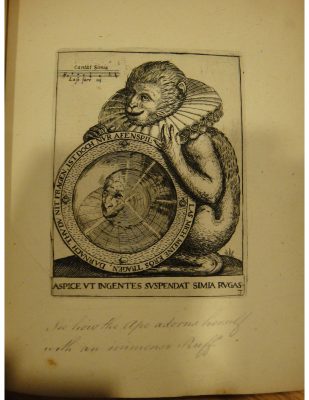
Fellows Talk: Andrea Celli on the Egyptian Slave Hagar in Early-Modern Visual Arts
A Troubling Presence: The Egyptian Slave Hagar in Early-Modern Visual Arts
Andrea Celli, Ph.D. (Department of Literatures, Cultures, and Languages; University of Connecticut)
February 26, 2020 – 4 to 5PM (UCHI Conference Room: Babbidge Library, 4th Floor South)
From late antiquity to the early-modern period, the Biblical character of Hagar, the Egyptian servant of Sarah and the mother of Abraham’s first child, Ishmael, was often employed as a disparaging device in Christian and Judaic literature. In the Middle Ages, Christian sources used Hagar and Ishmael derogatorily in relation to Muslims; they were the putative descendants of a servant and of the illegitimate son of Abraham and therefore they were not entitled to inherit God’s covenant with Abraham. Yet, Hagar became a successful and popular subject in sixteenth and seventeenth century visual arts, a shift that suggests that patrons and artists were permitted to publicly express compassion toward the fate of an outcast. How to explain this change in approach to a feminine character that often stood for deprecated religious communities and marginalized subjects? This paper will address this visual shift and the broader conceptualization of the figure of Hagar.
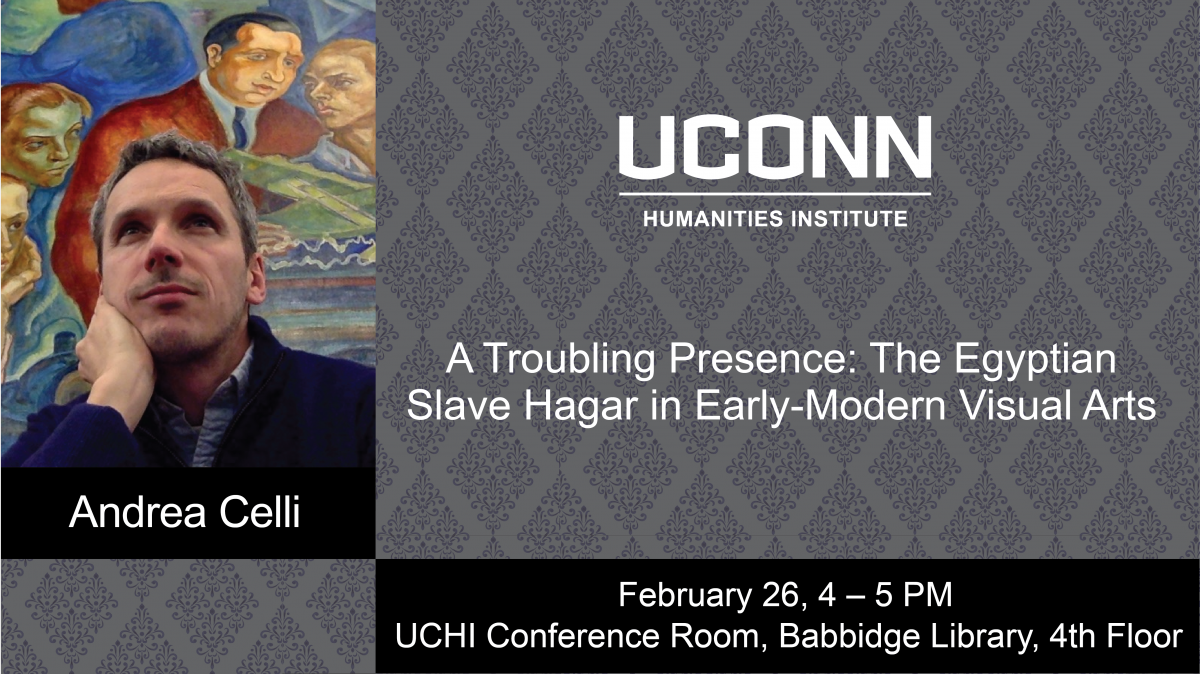
If you require accommodation to attend this event, please contact us at uchi@uconn.edu or by phone (860) 486-9057.
Who is Andrea Celli?
Andrea Celli is an Assistant Professor of Italian Literature and Cultural Studies at the University of Connecticut. He graduated in “Letteratura moderna” at the Univerità di Padova (Italy), where he also received his PhD Degree in “Filologia italiana ed Ermeneutica” (2004). In 2012–2013 he spent one year as a visiting fellow at the School of Advanced Study (Institute of Germanic and Romance Studies – University of London). From 2007 to 2014 he lectured “Ermeneutica e Storia della Critica” at the MA in “Lingua, letteratura e civiltà italiana” (University of Lugano, Switzerland). He has published several monographs, essays, and chapters, and translated a number of works from French and Arabic authors (e.g. Louis Massignon and Adonis). His current projects include a study on re-readings of the narratives of Hagar and Ishmael in counter-Reformation discourses on Islam; a monograph on Islam in early-modern Mediterranean Europe, and an Italian translation of Ernst Kantorowicz’s Das Wesen der muslimischen Handwerkerverbaende.
